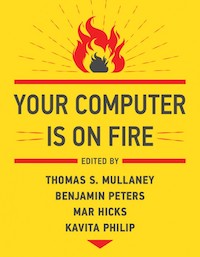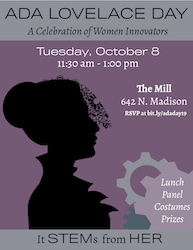This fall we will be back to campus for in-person courses. I will be teaching my I222: The Information Society and my I400: Computing and the Environment courses.
Fall 2021 semester
August 11, 2021
#teaching
The Cloud is a Factory, excerpted
May 20, 2021
#publications
The website Fast Company posted an excerpt of my chapter from Your Computer is on Fire today. The excerpt is from my discussion of the continuity between the industrial and informational economy, which focuses on the similarities between Sears Roebuck in the early 20th century and Amazon.com in the early 21st.
The Cloud is a Factory
February 14, 2021
#publications
I am immensely proud to be part of the new volume Your Computer is on Fire, published by MIT Press and edited by Thomas S. Mullaney, Benjamin Peters, Mar Hicks and Kavita Philip. This is a book that came out of a conference hosted several years ago at Stanford University, and which was aimed at radically reinvisioning the history of computing to explore the ways in which inequality, marginalization, and biases woven into our technological systems. The opening chapter of the book is my essay “The Cloud is a Factory,” which discusses the relationship between the digital economy and the natural environment. In addition to this essay and those written by the editors, YCOIF includes pieces from a stellar array of historians and social scientists, including Sarah Roberts,
Mitali Thakor, Corinna Schlombs, Halcyon M. Lawrence, Safiya Umoja Noble, Andrea Stanton, Noah Wardrip-Fruin, Janet Abbate, Ben Allen, Sreela Sarkar, and Paul Edwards. Here is a short blurb that describes the overall project of this book: This book sounds an alarm: after decades of being lulled into complacency by narratives of technological utopianism and neutrality, people are waking up to the large-scale consequences of Silicon Valley–led technophilia. This book trains a spotlight on the inequality, marginalization, and biases in our technological systems, showing how they are not just minor bugs to be patched, but part and parcel of ideas that assume technology can fix—and control—society. For more information, visit MIT Press. On March 9, 2021 we will be hosting a virtual book launch, which you are all welcome to attend! UPDATE: the book has been receiving a lot of press coverage lately, including such venues as the LA Review of Books, New Scientist, Venture Beat, RadicalAI, HearSay Culture, Engadget, and the Italian Newsflash24.
I400 - Computing and the Environment
February 08, 2021
#teaching
For the spring 2021 semester, I am offering a brand new course on Computing and the Environment. For an overview of the course, see the syllabus.
Sabbatical
July 01, 2020
#teaching
I am on sabbatical for the fall 2020 semester. I may be slow to respond to emails and other requests.
Ada Lovelace Day Celebration
October 02, 2019
#media
October 8 is Ada Lovelace Day, which celebrates the achievements of women in science, technology, engineering and mathematics (STEM). As part of the larger international movement organized around Ada Lovelace Day, Indiana University is hosting a series of public events, panels, and activities. Because of my research on the history of women in computing, I will be participating on one of the panels. The event is free to the public, but you will need to register in advance at http://bit.ly/adaday19.
NSF Grant - The Future Matrix of Care
August 21, 2019
#research
I am very pleased to be one of the co-PIs on the recently awarded NSF Grant 1928547, FW-HTF-P: The Future Matrix of Care: Communities, Networks, and Technologies. This planning grant proposal is part of the NSF Future of Work Initiative, and “seek[s] to bring together engineers, computational social scientists, anthropologists, health experts, public servants, and community members to develop a technologically augmented, community-based vision of the workforce for care for the 21st Century.”
IEEE Golden Core Award
May 20, 2019
#media
#research
I am pleased and honored to be the recipient of the IEEE Golden Core Award. A small number of Golden core awards are granted each year to persons who “served the society in significant ways throughout its 50 years … making the Golden Core group a permanent roster of the principal contributors to the society’s success.” The award is in recognition of my time serving in various roles, including editor-in-chief, of the IEEE Annals of the History of Computing. The IEEE has been central to the academic study of computing for more than a half-century, and I am grateful for the opportunity to have contributed to its mission.
The Secret History of Women in Coding
February 13, 2019
#research
#media
#gender
In today’s issue of the New York Times, the journalist Clive Thompson has published a brilliant excerpt from his forthcoming book Coders. In it he references my work on the history of women in computing.
The Environmental History of Computing
December 30, 2018
#publications
As part of a special issue of the journal Technology & Culture exploring new directions in the history of computing, my article on The Environmental History of Computing has finally been published! Describing the various ways in which computing intersects with the environment — from the mining of minerals essential to the construction of digital devices to the massive amounts of water and energy used to generate virtual commodities to the pollution associated with the production and disposal of electronics. It provides a nice preview of my forthcoming book project The Cloud is a Factory. The journal article can be download directly for readers with access to the appropriate academic subscriptions. Everyone else can view a preliminary version based on a talk that I been giving at various
institutions
over
the
past
few
years.
Professor Nathan Ensmenger
Nathan Ensmenger is an Associate Professor in the Informatics department of the Luddy School of Informatics, Computing and Engineering at Indiana University.
He specializes in the social and labor history of computing, gender and computing, and the relationship between computing and the environment.
OFFICE HOURS (Spring 2025): 1-3pm Monday, noon-1pm Tuesday My office is in Myles Brand Hall, room 229



